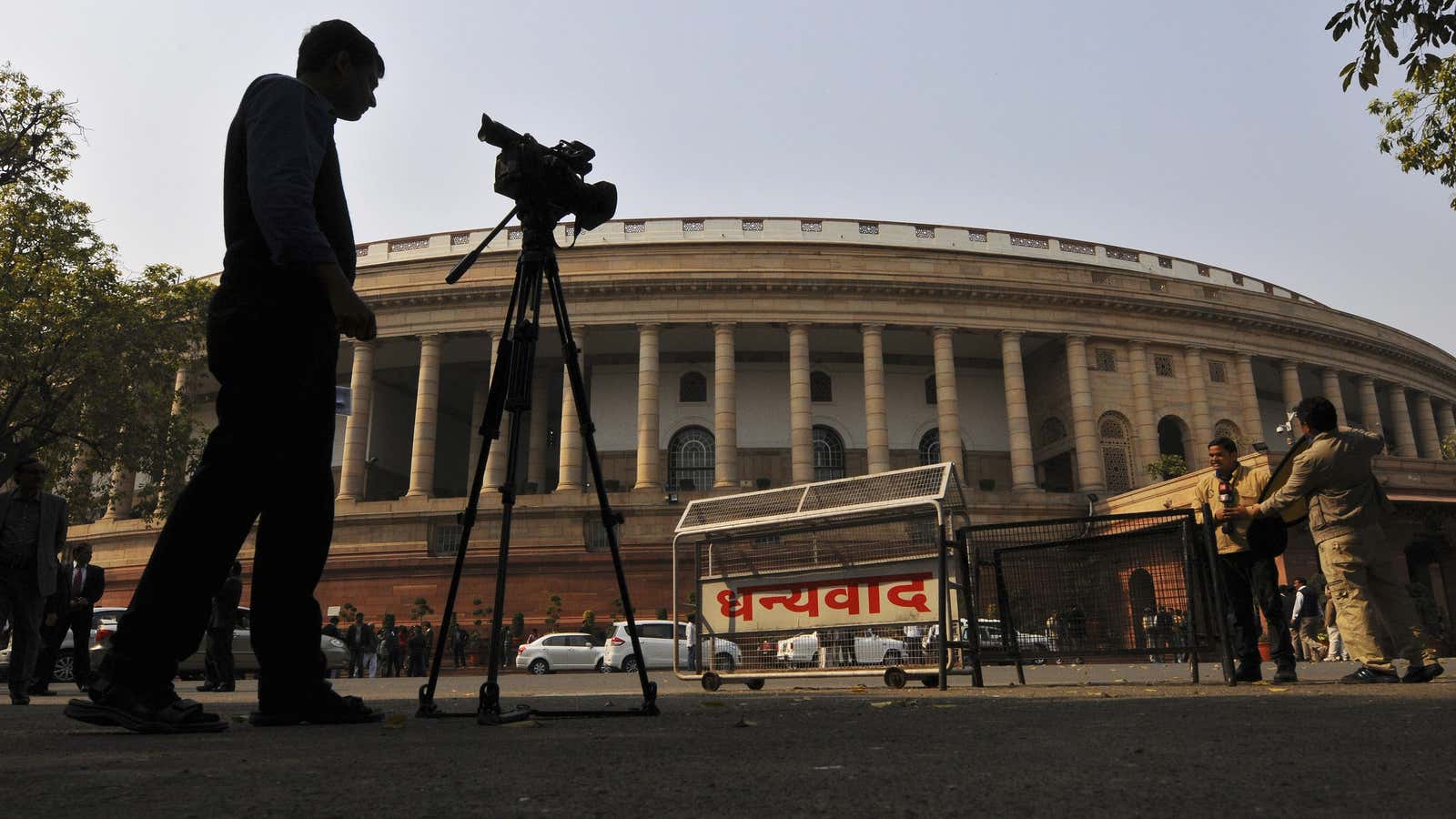India’s ranking on the press freedom index fell further this year, but the Narendra Modi government believes the rankings themselves are dubious.
Yesterday (July 19), during the monsoon session of parliament in the upper house, information and broadcasting minister Anurag Thakur said that though the government has seen reports of the press freedom index ranking, it does not consider these relevant (pdf). “The government does not agree to the conclusions drawn by this organisation for various reasons,” Thakur said, which included “very low sample size, little or no weightage to fundamentals of democracy, adoption of a methodology which is questionable and nontransparent, and lack of clear definition of press freedom, etc.”
Thakur was responding to parliamentarian KR Suresh Reddy’s questions about India’s ranking on French NGO Reporters Without Borders’ (RSF) World Press Freedom Index. Reddy asked the government if it is a fact that India’s ranking is a “lowly” 142 out of 180, if the government was undertaking steps to improve it, and if there has been a decline in India’s ranking over the past years.
The RSF brings out the press freedom index annually and bases its rankings on a combination of qualitative and quantitative data. It sends out a detailed questionnaire to experts across the world, and analyses these alongside data of deaths of and violence against journalists.
While releasing the rankings this year, RSF had called India “one of the world’s most dangerous countries for journalists trying to do their job properly.” It also put the onus of this lack of freedom at the feet of prime minister Modi’s Bharatiya Janata Party (BJP), under which “pressure has increased on the media to toe the Hindu nationalist government’s line,” it noted.
Threat to Indian journalists
According to RSF, the reason for India’s ranking is linked to the deaths of four journalists related to their work and criminal prosecutions against those who are critical of the authorities. “The situation is still very worrying in Kashmir, where reporters are often harassed by police and paramilitaries and must cope with utterly Orwellian content regulations, and where media outlets are liable to be closed, as was the case with the valley’s leading daily, the Kashmir Times,” it noted.
Journalists like Siddique Kappan, who was on his way to Uttar Pradesh to cover the alleged rape of a Dalit woman was arrested under the vastly empowered Unlawful Activities Prevention Act and continues to be in prison since October 2020.
Manipuri journalist Kishorechandra Wangkhem and activist Erendro Leichombam were arrested on May 13 for a Facebook post that debunked cow urine as a cure for Covid-19. In these posts, it was alleged that the two men called out the state BJP chief for his anti-science stance. While they were initially released on bail, they were re-arrested under the National Security Act on May 18. The supreme court has now ordered Leichobam’s release but Wangkhem continues to be in jail.
Such instances across India add up. In 2020, according to a report by Delhi-based Rights and Risk Analysis Group, as many as 55 journalists “faced arrest, registration of FIRs, summons or show-cause notices, physical assaults, alleged destruction of properties and threats” for reporting on COVID-19 or “exercising freedom of opinion and expression during the national lockdown between March 25 and May 31, 2020,” The Wire reported.
It is also likely that Indian journalists are heavily surveilled.
Indian journalists on the Pegasus list
Nearly 40 journalists are suspected to be on the list of those who were possibly targeted by the Pegasus software, an intrusive surveillance tool developed by Israel’s NSO Group for “vetted governments.”
Phones of prominent journalists like The Wire’s Sidharth Varadarajan and MK Venu were found to be compromised in a forensic analysis that was a part of a global exposé on the use of the Pegasus software by governments. Besides journalists, the list also had names like Congress leader Rahul Gandhi, former election commissioner Ashok Lavasa, political strategist Prashant Kishor, and noted vaccinologist Dr Gagandeep Kang.
Information technology minister Ashwini Vaishnaw said in parliament yesterday (July 19) that these reports “appeared to be an attempt to malign the Indian democracy and a well-established institution.” Vaishnaw’s number was also on the list of Pegasus exposé.
